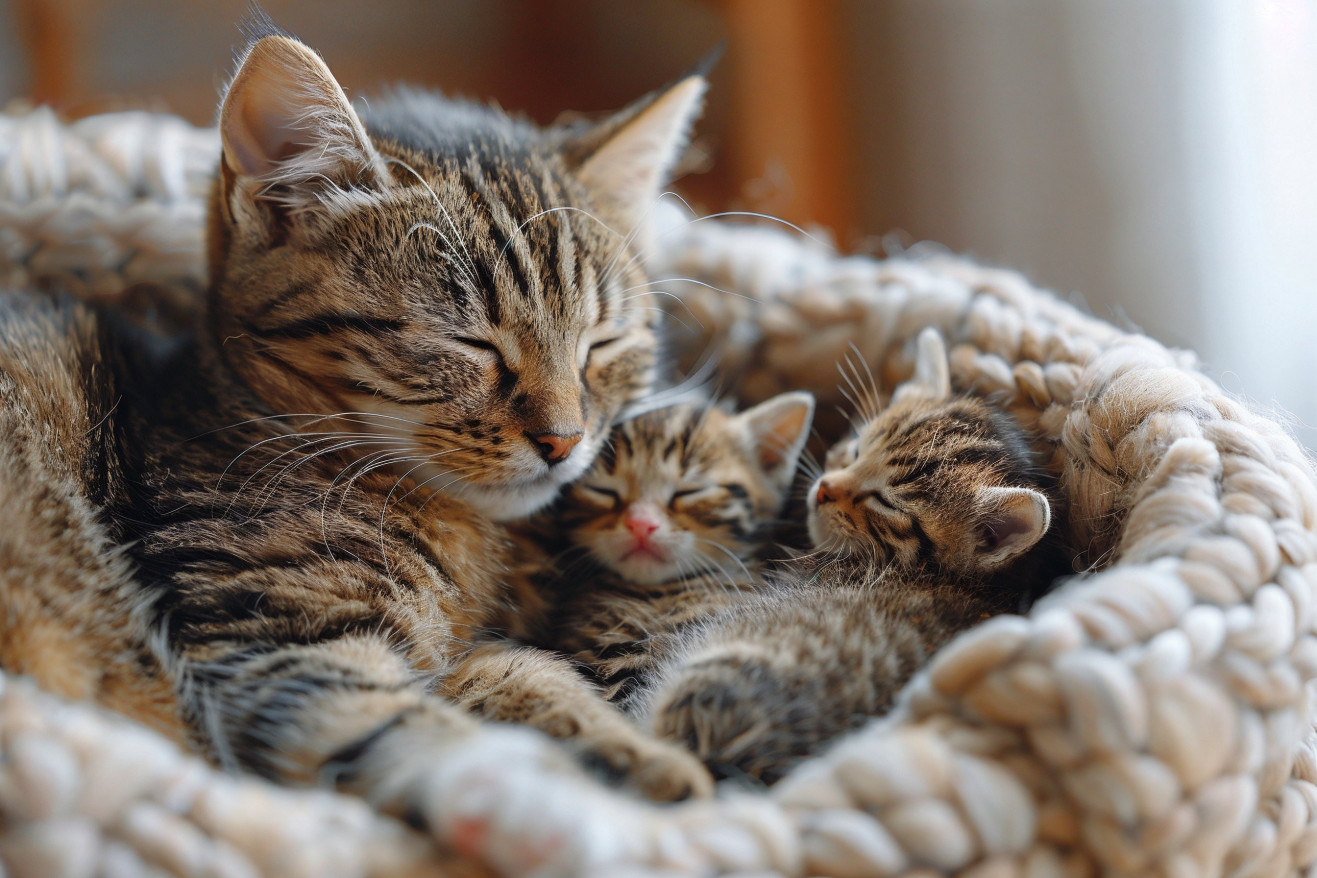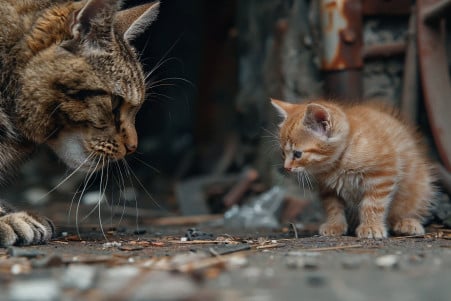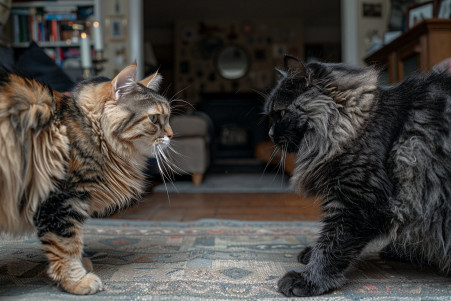The Harsh Truth: Why Do Cats Eat Their Own Kittens?
13 May 2024 • Updated 13 May 2024

As disturbing as it is, there are a number of reasons why cats resort to eating their own kittens. Cats are evolutionarily programmed to ensure the survival of the healthiest offspring. If a kitten is born with a deformity or illness, the mother cat will prioritize her own and the rest of the litter's well-being by getting rid of the weaker kitten, even if that means eating it for sustenance.
In this article, we will take a deep dive into the scientific literature in the fields of animal behavior, evolutionary biology, and feline reproduction to better understand this dark yet adaptive behavior. Through real-life examples, expert insights, and biological explanations, you'll walk away with a full picture of the situations that can lead to this extreme form of cannibalistic infanticide in cats. Although disturbing, this article seeks to offer an unbiased look at the complex interplay of maternal instincts and survival tactics in the animal world.
Do cats eat their own kittens?
Maternal Instincts and Evolutionary Drivers
The phenomenon of cats eating their kittens can be explained by evolutionary biology. According to research cited by Hepper, a mother cat's sense of smell is so strong that she can sniff out any genetic abnormalities or diseases in her newborn kittens that could threaten the rest of the litter. In the wild, this is an efficient way to make sure that the mother's resources are not being used on kittens that are not likely to survive, and it increases the likelihood that the healthy kittens will make it.
This horrible behavior is an instinct that has been hardwired into the cat's biology and evolutionary history as an obligate carnivore. As explained on MessyBeast, male cats may kill kittens they suspect were fathered by another male so that they can mate with the female again and ensure that their own genes are passed on. Even domestic cats can exhibit these behaviors because they are so closely related to their wild ancestors.
While this information may not make cat owners feel any better about the fact that their cats are eating their kittens, it does provide some insight into the evolutionary reasons behind this brutal but efficient behavior. It also helps cat owners understand when and why these instincts may be triggered so that they can do their best to prevent it.
How to Identify and Prevent Infanticide
According to the Animal Humane Society, signs that a mother cat may be considering infanticide include a lack of kittens in the nest, a lack of kittens moving around on their own, and the mother cat showing signs of aggression toward her kittens. One way to prevent infanticide is to make sure that the mother cat has a safe, quiet space in which to give birth and care for her kittens.
Another way to prevent infanticide is to make sure that the mother cat is well-fed and that she has everything she needs to care for her kittens, according to PetFoodMark. It's also important to monitor the mother cat's behavior and to contact a veterinarian if there are any signs that she may be considering infanticide. In some cases, it may be necessary to separate the mother cat from her kittens and to provide them with care to ensure that they survive.
By learning to identify the signs of infanticide and taking steps to prevent it, cat owners can help make sure that their mother cats and their kittens stay safe and healthy.
How to Help a Mother Cat After Infanticide
If a mother cat has killed and eaten her kittens, it is important not to punish or blame her, as this is an instinctual response. As the Animal Humane Society explains, it is important to work with a vet to determine if there are any medical or psychological reasons that may have caused the infanticide.
The mother cat may need special care and attention, including things like extra nutrition or ways to reduce stress, as the Concordvets article points out. In some cases, the kittens that are left may need to be hand-reared or placed with another nursing mother cat.
It is important to make sure that the mother cat is in a safe, comfortable environment and to keep an eye on her progress and her potential for future litters. With the right care and attention, and by working with a vet, cat owners can help the mother cat recover and possibly avoid future instances of infanticide.
Male Cats and Kitten Aggression
Male cats, especially those that are not neutered, may show aggression or predatory behavior toward kittens that they haven't sired. According to research cited by Hepper, this is because the male cat is acting on an instinct to ensure his own genes are passed on while also removing competition. As noted on MessyBeast, male cats can smell the presence of other males on kittens and may kill them to bring the mother back into heat for mating.
Neutering male cats can reduce the chances of this behavior and make it possible for them to live with kittens in peace, according to Catster. However, in homes with multiple cats, it's important to watch how male cats interact with kittens and take steps to protect the kittens. Knowing the biological reasons behind this behavior can help cat owners keep their kittens safe and create a happy environment for all of their cats.
How to Introduce a Kitten to an Adult Cat
The introduction of a new kitten to an adult cat must be done slowly to prevent territorial or aggressive behavior, notes The Spruce Pets. This means that the kitten and the resident cat will need to be kept in separate areas at first so that they can get used to each other's scents.
Before letting the cats live together, interactions between the two animals should be monitored and controlled, says Hill's Pet. In addition, Fear Free Happy Homes recommends making sure that there are plenty of resources available, including litter boxes, scratching posts, and places to hide.
It's important to be patient, keep an eye on the cats, and ask for help from a professional if necessary to ensure that the introduction goes well and that the cats will be able to live together successfully, notes International Cat Care and The Humane Society of the United States. With these guidelines in mind, cat parents can help make the transition easier and set the stage for a happy relationship between their new kitten and their resident cat.
Conclusion: Understanding and Preventing Feline Infanticide
Male cats, especially those that are not neutered, are more likely to be aggressive or predatory toward kittens that are not their own. According to research cited by Hepper, this is because they are following an evolutionary drive to ensure their own genes are passed on while eliminating potential competitors. As MessyBeast explains, male cats can smell the scent of other males on kittens and may kill them to enable the female to come back into estrus and mate.
Neutering male cats can greatly reduce the likelihood of this behavior and make it easier for them to coexist with kittens, as Catster points out. However, in multi-cat households, it's important to supervise the interactions between male cats and kittens and take steps to ensure the kittens' safety. By understanding the biological underpinnings of this behavior, cat owners can make sure to protect their kittens and create a safe and happy environment for all of their feline family members.


